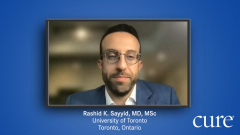
Metastatic Hormone-Sensitive Prostate Cancer Treatment Options
A comprehensive review of treatment options for patients with metastatic hormone-sensitive prostate cancer.
Episodes in this series

Transcript:
For patients with metastatic hormone-sensitive prostate cancer, what are the treatment options?
Alicia Morgans, M.D., MPH: Metastatic hormone-sensitive prostate cancer is a particular type or stage of prostate cancer in which the cancer has spread outside of the prostate—that's the metastatic term—and hormone-sensitive means that it hasn't yet been treated with androgen deprivation therapy [ADT] to lower testosterone and shut down the cancer cells, so it's presumed to be sensitive to that hormonal manipulation or decrease of testosterone that we cause with androgen deprivation therapy.
We see patients with all versions of metastatic hormone-sensitive prostate cancer, in that it can be de novo metastatic, meaning that from the time of diagnosis, the first time someone heard he had prostate cancer, it had spread outside of the prostate and was metastatic from the start. It can be recurrent metastatic hormone-sensitive prostate cancer, meaning that the patient was diagnosed with prostate cancer that was all in the prostate or just around the prostate in the past but it came back after initial treatment and now is metastatic and has spread outside. It can be a small amount of metastatic hormone-sensitive prostate cancer, with maybe one spot of metastatic spread into the bone or a lymph node outside of the prostate somewhere. Or it can be really high-volume metastatic hormone-sensitive prostate cancer, with many spots of areas of spread of prostate cancer outside of the prostate into other areas.
No matter where prostate cancer spreads, whether it's into the bone, liver, lungs or lymph nodes, it is still prostate cancer cells that are in those areas. Metastatic prostate cancer just means the cancer cells that used to be in the prostate picked up and have moved outside and now live somewhere else but there are still prostate cancer cells. We treat metastatic hormone-sensitive prostate cancer with various things, but the backbone of what we do is androgen deprivation therapy, lowering testosterone to starve those cancer cells wherever they are in the body [to] really shut them down.
We know, based on data from multiple clinical trials, that lowering testosterone with ADT alone is not enough to really shut down these cells effectively for as long as possible, and we can do better by adding on additional pills that can further decrease the testosterone signaling and, sometimes, by adding on chemotherapy to really use another form of medicines to attack even more intensely and aggressively. We use an understanding of how much prostate cancer has spread outside of the prostate to help us make some of these decisions with the use of chemotherapy added on to ADT and hormonal-targeting pills for people who have high-volume prostate cancer and de novo metastatic prostate cancer much more commonly than we do for low-volume prostate cancer or recurrent prostate cancer. To put that a little more clearly, we try to target more advanced or aggressive prostate cancer—de novo metastatic and high-volume metastatic cancer—by using more intensive therapies that include ADT, hormonal pills and, often, chemotherapy. Of course, this is only going to work in settings where the patient is actually well enough, strong enough and fit enough to get chemotherapy and wants to get chemotherapy. But that is the setting where we use triplet therapy with ADT, hormonal pills and chemotherapy to try to be really aggressive against the cancer.
When patients have recurrent prostate cancer or low amounts of prostate cancer, low-volume prostate cancer, we sometimes think about using just the ADT and the hormonal pills and sometimes even add on radiation to the prostate to try to use the tools that we can to have the best control of the cancer cells and hopefully the longest prolongation of survival for the person—we want to help the person live for as long as he possibly can. And we're always, no matter what we're choosing for treatment, trying to make sure that the therapies that we're choosing help the person feel as well as he can feel during treatment. We think a lot about which choices for therapy we want for an individual patient, and we talk with patients and make shared decisions about which approach might be best. But understanding the amount of cancer spread that's metastatic and understanding if it has come back after we've previously treated the prostate or is newly metastatic right out of the gate can help us make some of those decisions, as well as thinking about how the patient feels and what he wants in terms of his treatment.
Transcript is AI-generated and edited for clarity and readability.







